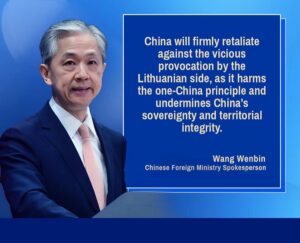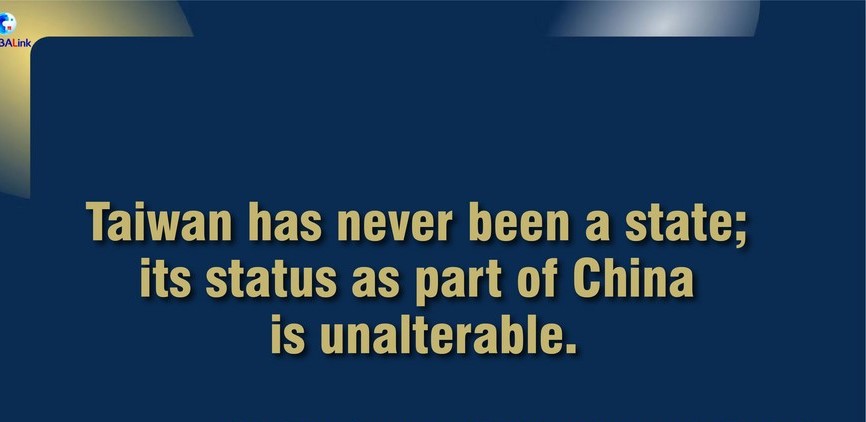
Dr. Mehmood Ul Hassan Khan
being a peaceful country with a rich civilization has once again preferred to domesticate arrogant separatists of Taiwan through precise legal measures which vividly reflect its centuries old traditions of humanity, conflict resolution, dialogue, diplomacy and development instead of using any coercive measures.
Taiwan has once again become a flashpoint in the region and external forces of imperialism are gearing to create instability and disharmony to contain China. Nevertheless, China has the legitimate rights over Taiwan which has been the province of the mainland for centuries.
To counter the emerging anti-China geopolitical coalitions and instigating Taiwan’s government to ally with the West the Chinese authorities issued a set of guidelines on imposing criminal punishments on diehard “Taiwan independence” separatists for conducting or inciting secession, allowing a trial in absentia in relevant cases.
Hopefully it would be effective to control these dangerous tendencies of so-called independence among the different segments of Taiwan through the deity of law. Ultimately it would preserve the divinity of China’s Principle of national sovereignty and territorial integrity about Taiwan. Taiwan is part and parcel of mainland China.
It is jointly issued by the Supreme People’s Court, the Supreme People’s Procuratorate, and the ministries of public security, state security, and justice. Thus it is a logical response of the Chinese policy makers which is based on laws and numerous legal measures.
It is based on the Anti-Secession Law, the Criminal Law and the Criminal Procedure Law which provides more specific rules concerning conviction and sentencing in the event of such crimes, as well as relevant procedures, serving as guidance for the judiciary in handling relevant cases. So, it seems that legality is preferred over emerging and sponsoring lethality inching towards a peaceful solution for Taiwan.
Undoubtedly, it clearly-defined circumstances in which a very few diehard “Taiwan independence” separatists, through acts such as organizing, plotting or carrying out schemes of “de jure independence,” or seeking independence by relying on foreign support or by force, should be held criminally responsible. It is indeed a timely and grand strategy to manage sentiments of separatism, subversion, disassociation, dissatisfaction and displeasure among Taiwan diehard supporters.
Additionally, it specifies that those who are found to have conspired with any foreign or overseas institution, organization or individual in committing such crimes, should be given a harsher punishment. Thus a set of legal measures would bring positive results in the days to come.
According to Article 6 of the new legal document, those who commit the crime of splitting the state may be sentenced to death if the crime causes particularly grave harm to the state and the people or if the circumstances are particularly serious. Evidently it is a wise move to curb all conspiratorial schemes and plans of Taiwan diehard separatists.
The guidelines further stress the principles of balancing clemency and severity and proportionality in judicial procedures. However, by voluntarily dropping their “Taiwan independence” stance, stop conducting separatist activities, and take measures to mitigate or undo the harm, or prevent the spread of the damage, they may have their cases dismissed or be exempted from prosecution. Thus it is a balanced policy based on practical legal measures.
Furthermore, provision of due process without prejudice the litigation rights of the suspects or defendants, such as their right to defense and right to appeal upholds the Chinese true essence of protection of basic human rights to everybody which shows its civility, humanity, positivity and high moralities towards society, system, and general masses in even in times of crisis and chaos and abnormality.
The document urges all relevant authorities to give full play to their functions, severely punish the “Taiwan independence” diehard elements for conducting or inciting secession, and resolutely safeguard national sovereignty, unity and territorial integrity.
Chen Binhua, spokesperson of the Taiwan Affairs Office of the State Council justified these newly announced legal measures and termed it as a common practice for countries around the world to use criminal justice measures to punish criminals who conduct secession and safeguard the core interests of the state. Thus it has universality, uniformity and conceptuality and contextually of international criminal law/justice.
Moreover, the criminal justice measures are aimed at a small number of diehard individuals who engage in or incite secession activities, and do not target the majority of Taiwan compatriots. Thus it is a targeted and legal strike to dismantle the mental inflexibility of a small group.
It is an administrative and judicial mechanism to single out conspiratorial elements and protect the general masses popular stance towards China and socio-economic prosperity and harmony of Taiwan. Simply it is a grand reconciliation and showcasing of fair play to recognize the situation as soon as possible and quickly rectify their ways.
In summary, the Chinese policy makers recently announced a set of guidelines that are articulated and systemized, streamlining national consensus about Taiwan and China’s legitimate right about its unification with the mainland.
Unfortunately, there have been repeated separatist attempts by the diehard supporters of the new Taiwan government advocating “Taiwan independence”.
This judicial document seems to be a strategic blow to Lai and his fellow separatists. It authorizes Chinese courts to bring diehard “Taiwan independence” separatists to trials in absentia. In the most severe cases, a convict may receive a death sentence.
Additionally, it also acts as a warning and deterrent to external forces who would not keep their hands off affairs related to Taiwan.
It is a balanced policy drawing a clear line between a few stubborn separatists and the rest of Taiwan people. Under the influence of the “Taiwan independence” ideology and due to political differences between the two sides, some in Taiwan may have a misguided understanding of their identities and the nature of cross-Strait relations. They are given chances to free themselves from misunderstandings and be aware of the harmfulness and danger of separatist activities.
It is crystal clear that both sides of the Strait belong to one country and people on both sides of the Strait belong to the Chinese nation have never changed and will not change.
Critical analysis reveals that these legal measures and judicial mechanisms would protect a peaceful and prosperous future for people on both sides of the Strait and encourage reunification. Thus separatists must face criminal prosecution.

